
All Solutions
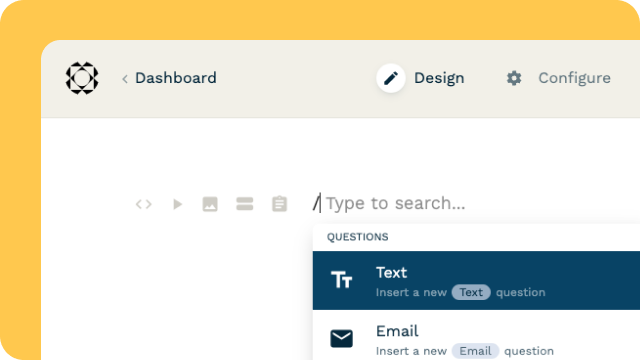
Explore all the solutions you can create with Paperform: surveys, quizzes, tests, payment forms, scheduling forms, and a whole lot more.
See all solutions










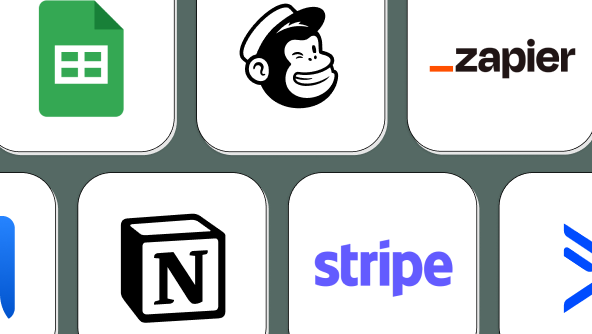
Connect with over 2,000 popular apps and software to improve productivity and automate workflows
See all integrationsProducts
Solutions
All Solutions

Explore all the solutions you can create with Paperform: surveys, quizzes, tests, payment forms, scheduling forms, and a whole lot more.
See all solutionsIntegrations

Connect with over 2,000 popular apps and software to improve productivity and automate workflows
See all integrationsResources
How This Tech Investor and Lawyer Automated a 35-Client Firm With Paperform
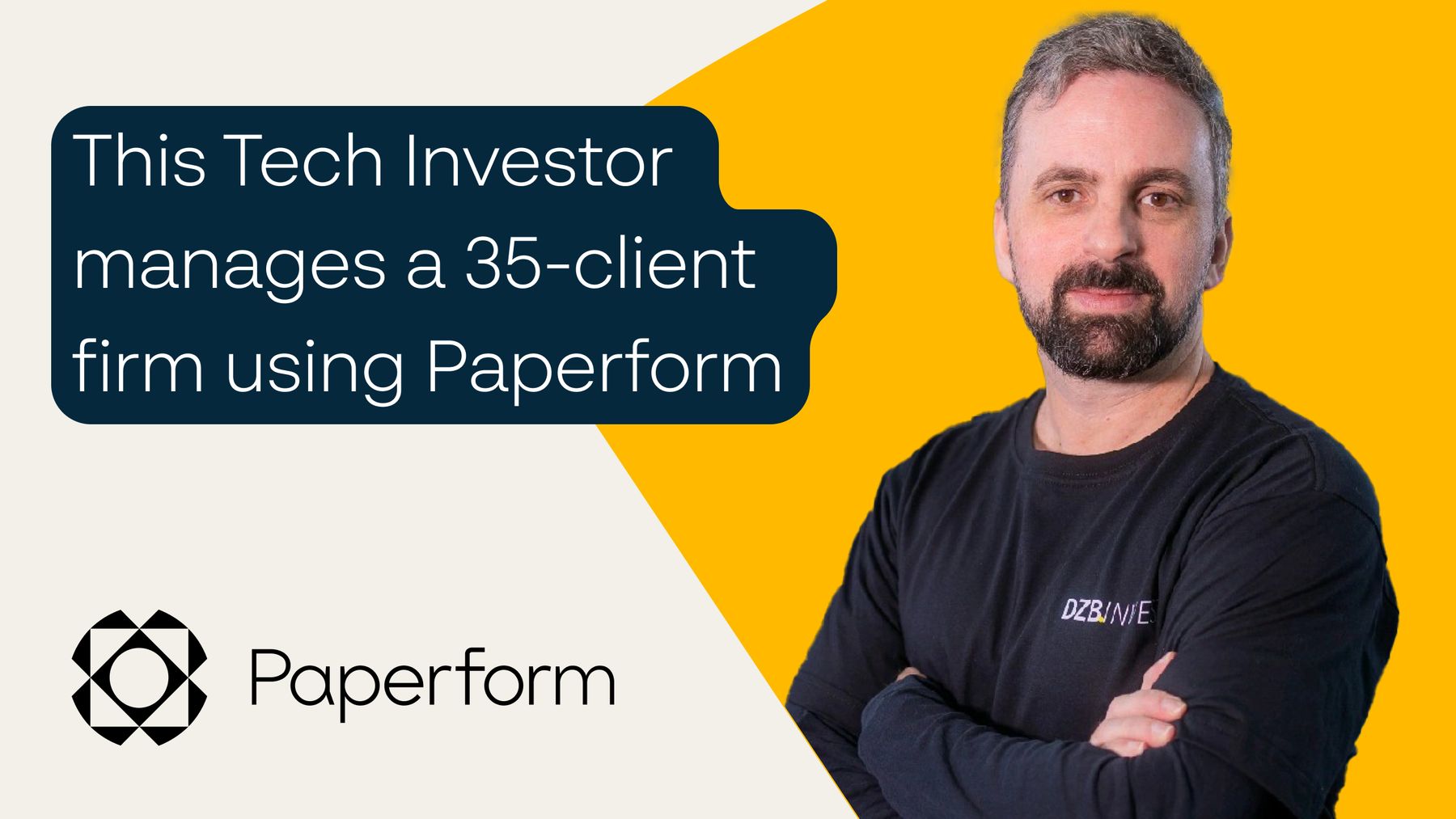
Turning complexity into clarity — one form at a time.
When you think of a lawyer, you might picture stacks of contracts and endless revisions.
José saw something else — code, automation, and forms.
A lawyer, startup fundraiser, and lifelong technologist from Brazil, José has spent nearly 20 years helping startups bridge the gap between law and innovation. He began by using Linux in college, and contributing heavily to the Ubuntu community.
"The saying in Brazil that we have from those days is: 'When I arrived, everything was a jungle.' In my case, when I started on the internet, everything was done by hand: code, HTML pages, rotating banners...everything.”
José has been practicing law in the digital field since he joined the Brazilian Bar Association around 2007. Initially, he focused on digital crimes and illicit activities, then on digital marketing (agencies and creators), and then he specialized in technology startups.
His early love of tech, and his deep experience in law, shaped how he now runs his firms, Lopes Advogados and DZB Invest, where he blends legal strategy with programming and automation. His seven-person team supports 35 tech companies, managing contracts, compliance, and investment fundraising from concept to close — all through Paperform.
About José Vitor Lopes e Silva

- Roles: Partner at DZB and Lopes Advogados
- Industries: Tech, Law, Startups
- Focus: José Vitor is a Brazilian tech lawyer, fundraiser, and partner who combines two decades of legal expertise with automation and coding to help startups streamline operations, secure funding, and scale efficiently.
- LinkedIn: https://www.linkedin.com/in/josevitor/
- Website: https://dzbinvest.com/
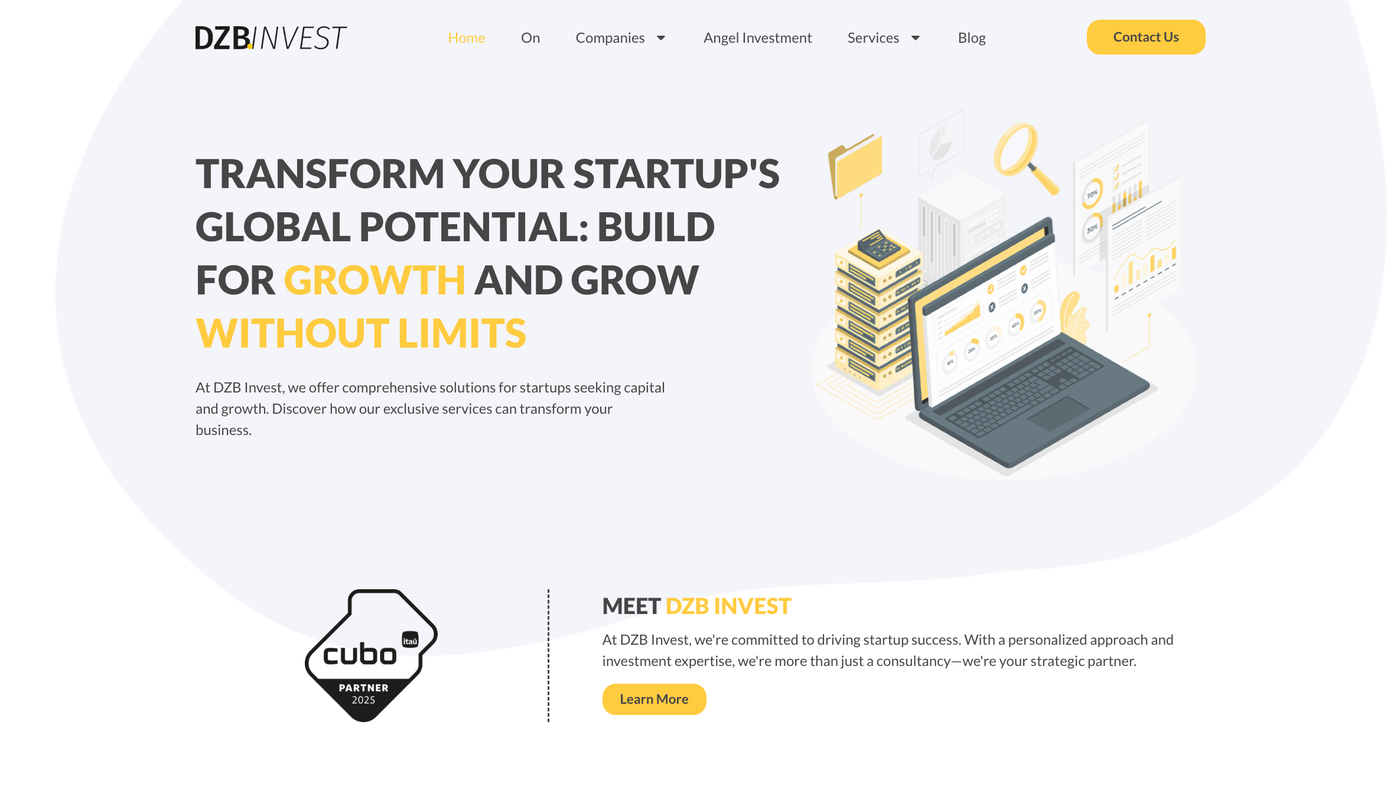
The Challenge: Too Much Work, Too Few Hands
Running two companies across law and investment isn’t simple. At Lopes Advogados, José’s team provides digital law and tech compliance for startups across Brazil. At DZB Invest, they handle full-cycle fundraising — from writing theses and building decks to negotiating with investors in both domestic and international rounds.
Managing all that with just seven people was impossible without automation.
Before Paperform, José’s team relied on email for intake and document requests. Tracking every client and round meant chasing data across multiple inboxes. “Before Paperform, it was a nightmare,” he says. “Information was stored in one place, dependent on one person. Now we use Paperform as our front end. The process starts and ends with one form.”
 José and some of his team members
José and some of his team membersThe Turning Point: One Weekend, One Form, One Big Shift
José first discovered Paperform in 2019 while working with a fast-growing mobility startup in São Paulo.
The company needed a faster way to process accident reports from drivers — a system their developers estimated would take over a year to build.
"From a Friday to Monday, I created this process using Paperform, Zapier, and Google Drive," José recalls. "The startup was planning to code this in a year and a half."
By Monday, his system was live. Drivers received automated forms via SMS after collisions, capturing photos, signatures, and incident details. What once took days now took minutes using Paperform— saving the company time, money, and risk.
"That weekend project became the foundation for everything I do now," José says.
Building an Automated Legal Engine
Today, José’s firm runs on Paperform.
He’s built an entire front-end using Paperform’s form logic, validation, and answer piping all connected to a custom back-end through Zapier. It links to Asana, Google Drive, Docs, Sheets, and PandaDoc, turning complex legal workflows into a seamless automated system.
"With Paperform, we can support 35 monthly clients, 10 to 25 investment rounds a year, and 2,000 demands," he says. "We segment requests, validate information, and direct them to each client’s environment automatically."
The setup is simple but powerful:
- Each client’s submission triggers automations that generate tasks in Asana, documents in PandaDoc, and folders in Google Drive.
- Smart Conditional Logic personalizes forms based on email domains, client type, and service need.
- One form replaces hours of manual classification and data entry.
"We don’t have a person to receive and classify information by hand anymore," José says. "The whole process starts and ends with Paperform."
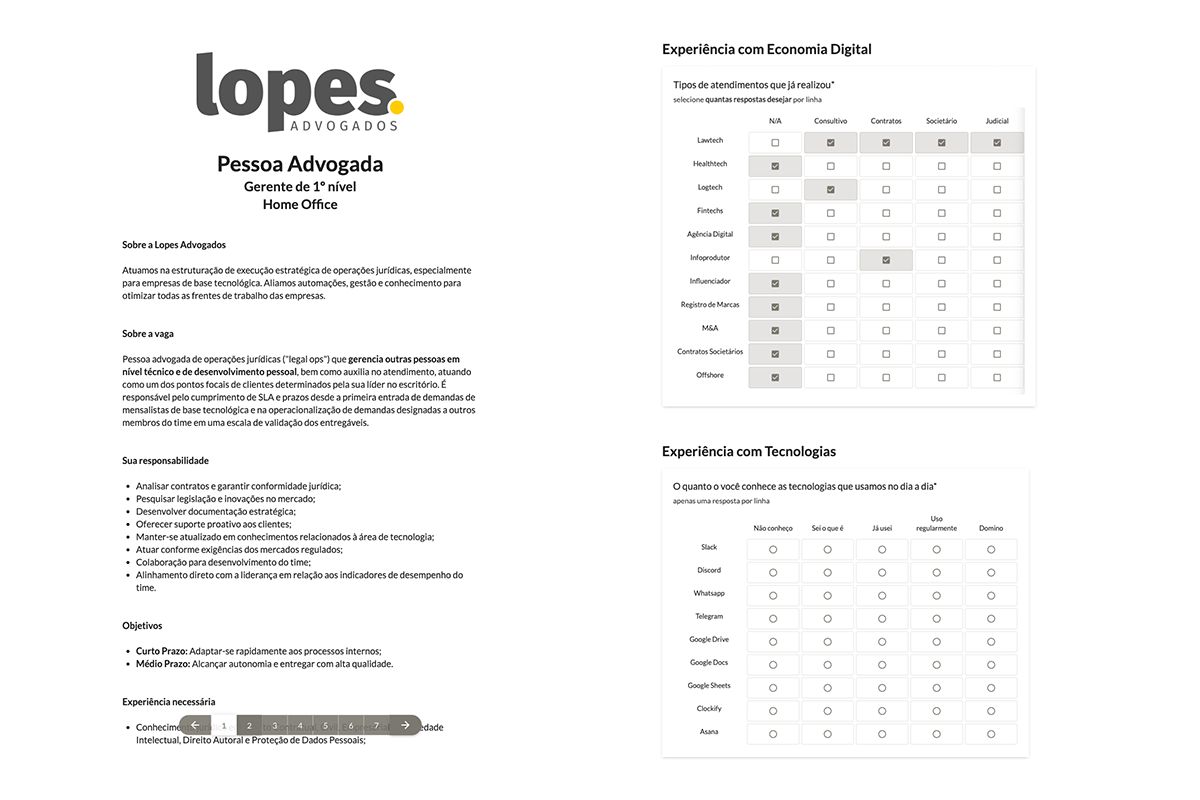 Example of a job application form from Lopes Avagados
Example of a job application form from Lopes AvagadosWhy This Tech Expert Chooses Paperform
Each submission in José’s system routes automatically to the right person, balancing workloads and keeping projects moving — even when his team is traveling.
"We balance demand automatically," he says. "I can spread information, send it to Slack, email, or Asana. We can organize our service even when the team is away."
By centralizing everything through Paperform, José estimates they operate with three fewer staff members than before — while managing more clients and delivering faster responses.
"We’re seven people doing the work of ten," he says. "That’s because Paperform is at the heart of our process."
For José, Paperform is not just a form builder, it’s infrastructure for his business.
"Paperform has features that competitors don’t," he says. "You have coding, answer piping, logic, redirection — all in one package. And the price is fair. It’s the best ROI I’ve found."
It’s also a platform he trusts to scale with him. Over nearly 20 years of working in digital law and tech, José has seen hundreds of tools come and go. Paperform has stayed and is a permanent part of his stack.
"Paperform is the best form builder out there. We’ve built our operations around it," he says. "It’s flexible, reliable, and powerful enough for serious work. It helps me work better, live better, and serve my clients faster."
The Lesson From José
José didn’t wait for perfect timing or perfect tools. He built what he needed.
A lawyer who learned Python at 37 and English at 40 now runs two businesses powered by automation.
"Start small," he advises. "Try field by field. Every single field you master, you can use. It’s never the first try that’s perfect."
His story proves that expertise and experimentation can coexist — and that even the most traditional professions can innovate.
FAQ: Paperform for Startups, Solopreneurs, and Small Business Owners
Q: How can Paperform replace other tools in my business?
Paperform can act as both your form builder and your workflow hub. José replaced multiple systems — client intake forms, contract requests, scheduling, and document creation — with Paperform. By connecting it to tools like Zapier, Asana, Slack, and Google Drive, his team manages thousands of requests from one place.
Q: Can Paperform help me automate processes in my business?
Yes. José’s team uses Paperform’s conditional logic, answer piping, and field validation to automatically route client data, trigger tasks, and generate documents. Instead of manually classifying requests, Paperform handles everything — freeing time for real work.
Q: What kind of workflows can I build with Paperform?
Anything from onboarding and intake to quoting, scheduling, and document signing. José built forms that identify clients, validate company data, and trigger legal document workflows — all without writing code.
Q: Is Paperform only for simple forms?
Not at all. José uses Paperform to power complex automations for over 35 tech companies. You can start with a basic form and expand to build full business systems that connect with your favorite apps through Zapier or native integrations.
Q: Can Paperform scale with my business?
Yes. José’s seven-person team supports 35 clients and over 2,000 yearly requests through Paperform. As your operations grow, you can layer in more logic, automations, and integrations — without rebuilding from scratch.
Q: How does Paperform compare to other form builders?
José tested many and stayed with Paperform because of its flexibility, coding options, and fair pricing. “You have features that competitors don’t,” he says. “Coding, answer piping, logic, redirection — all in one package.”
Q: What results can I expect from automating with Paperform?
Teams save hours, eliminate manual errors, and deliver faster service. For José, automation helped his firm manage five times more fundraising success for clients — and operate with three fewer team members.
Ready to build forms that scale with you?
José's results with Paperform aren't an accident. It's the result of his experience using powerful tools to upscale operations through automation.
If you want to see how Paperform can become the nerve center of your business, start your free trial today and experience the flexibility he relies on every day.
🔗 Learn more at paperform.co
📣 Want to chat with Jose? Contact him directly through his booking form.
Or Connect with DZB or find him on LinkedIn.
Start your free trial today
Or contact us at support@paperform.co to learn how real estate pros use Paperform every day
Form a better life now.
Related reading
Form a better life now.
Get your 7 day unrestricted trialSmileBox started in a bedroom and scaled to 30,000 orders. Here’s how founder Tom Wrench used Paperf...
When Kathleen Celmins launched her AI-powered app, GlowSocial, she quickly realized that building cu...
Paperform has been recognized as a 2026 G2 Best Software Award winner! It is an honour we are deeply...
Trying to decide between Zapier and Stepper? This in-depth comparison breaks down pricing models, wo...